Garlic can offer some health benefits during pregnancy, like boosting your immune system and potentially lowering blood pressure. However, it can also cause heartburn and increase bleeding risk if consumed in large amounts. Moderation is key, so it's best to cook garlic in your meals rather than eating it raw. Be sure to check with your healthcare provider for personalized advice on incorporating garlic safely into your diet and discover more essential information about this powerful ingredient.
Key Takeaways
- Garlic offers health benefits during pregnancy, such as enhancing the immune system and reducing infection risks.
- Excessive garlic can increase bleeding risk due to ajoene, particularly if consumed raw.
- Heartburn and gastrointestinal discomfort may worsen with high garlic intake.
- Cooking garlic can mitigate potential side effects while still providing nutritional benefits.
- Always consult a healthcare provider for personalized advice on garlic consumption during pregnancy.
Understanding Garlic and Its Components
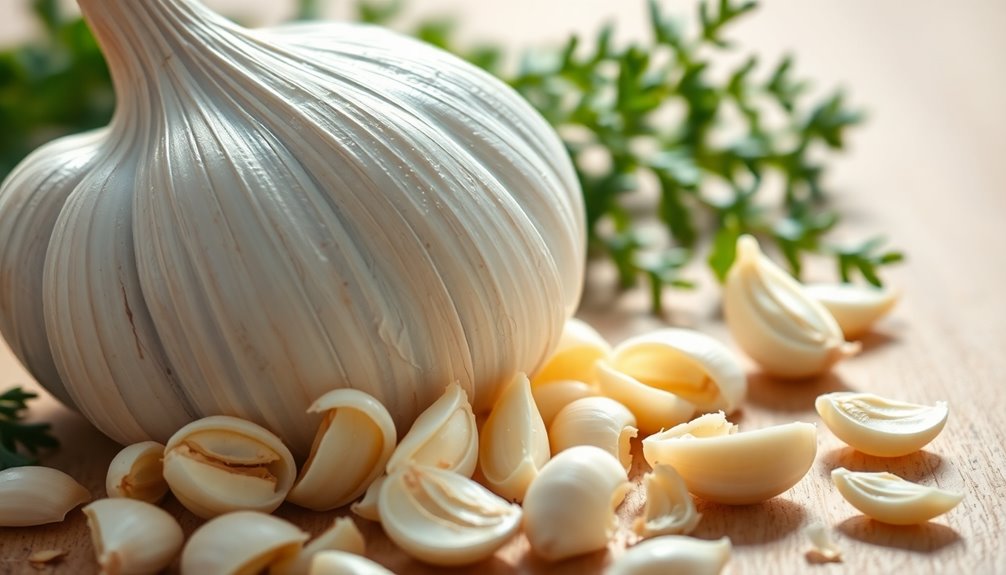
Garlic, known scientifically as Allium sativum, is more than just a flavorful addition to your meals; it's packed with active compounds that offer various health benefits.
One of its key components, allicin, contributes to garlic's medicinal properties, showcasing antimicrobial and anti-inflammatory effects. For pregnant women, garlic may provide cardiovascular benefits by helping to lower blood pressure and maintain healthy cholesterol levels.
Allicin in garlic offers antimicrobial and anti-inflammatory benefits, while supporting cardiovascular health for pregnant women.
However, you should be cautious, as excessive garlic consumption can increase bleeding risk due to the sulfur compound ajoene, especially in supplement form.
Additionally, the strong aroma and taste of garlic might lead to heartburn or gastrointestinal discomfort for some pregnant women, so moderation is essential for a healthy experience.
Potential Benefits of Garlic During Pregnancy
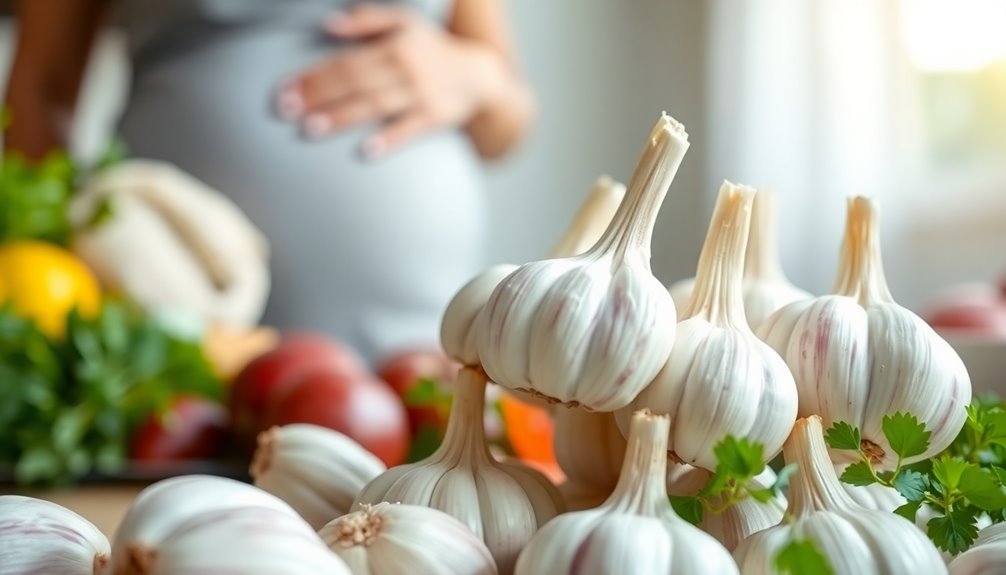
When you're pregnant, incorporating garlic into your diet can offer several potential benefits that support both your health and that of your baby. Consider these advantages:
- Immune Boost: Garlic's antimicrobial properties can enhance your immune system, potentially reducing infection risks during pregnancy.
- Lower Blood Pressure: Some studies suggest that garlic consumption may help lower the risk of preeclampsia, a serious condition characterized by high blood pressure.
- Digestive Aid: Eating garlic can promote digestive enzyme production, helping alleviate common digestive issues many expecting mothers face.
With its rich nutrient profile, including vitamin C and selenium, garlic fits well into a healthy pregnancy diet.
Plus, it helps combat oxidative stress, promoting better health outcomes for you and your baby.
Risks Associated With Garlic Consumption
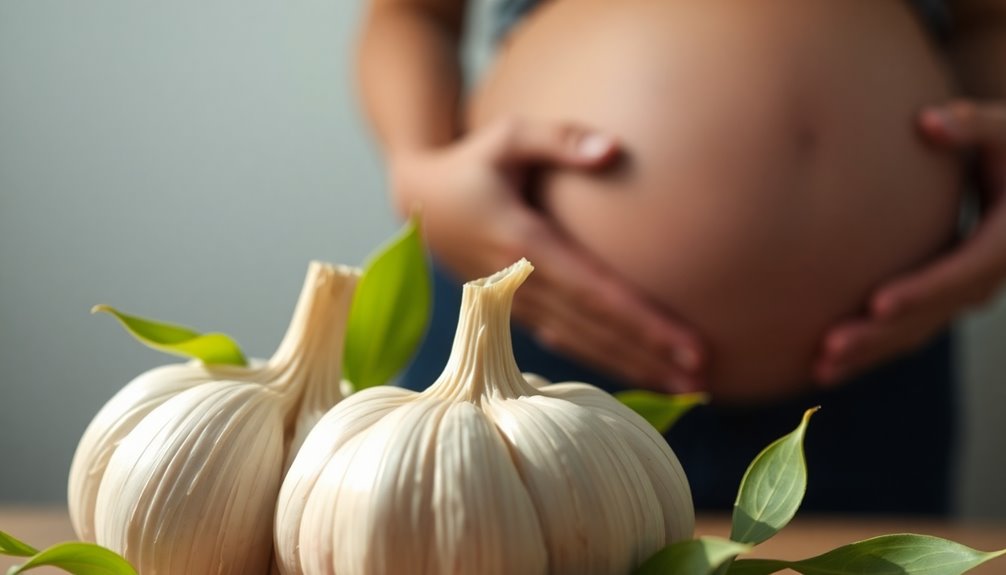
While garlic can provide various benefits during pregnancy, it's important to be aware of the potential risks associated with its consumption. High amounts of garlic, especially in supplement form, may increase the risk of bleeding due to ajoene, a compound that inhibits platelet formation. Additionally, pregnant women often experience heightened heartburn symptoms, which garlic might exacerbate.
| Risks of Garlic Consumption | Recommendations |
|---|---|
| Side effects like heartburn | Avoid eating raw garlic |
| Increased risk of bleeding | Consultation with a healthcare provider is crucial |
| Gastrointestinal discomfort | Limit intake of high amounts of garlic |
To guarantee your safety, consult with a healthcare provider before incorporating garlic into your diet.
Safe Ways to Incorporate Garlic in Your Diet
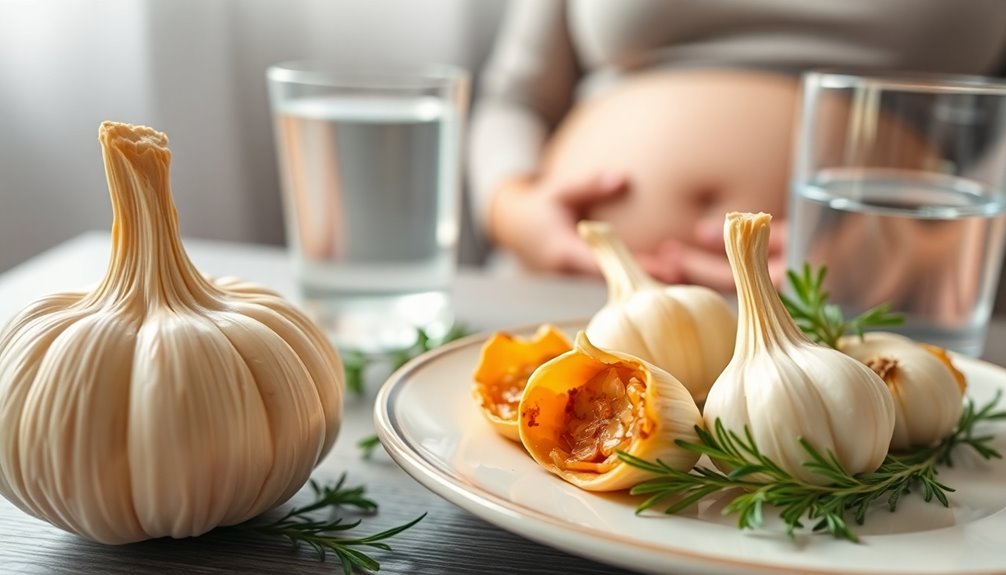
Incorporating garlic into your diet during pregnancy can be both safe and enjoyable, as long as you stick to moderate amounts. Here are some safe ways to include garlic:
Including moderate amounts of garlic in your pregnancy diet can be both safe and enjoyable.
- Cooked Dishes: Add garlic to soups, stews, or marinades. Cooking makes it safe to eat and reduces its strong flavor.
- Garlic Juice: Use 600-1,200 mg of garlic juice in your meals for added health benefits.
- Nutritional Boost: Garlic is rich in vitamins C and B6, providing essential nutrients while following a healthy diet.
It's important to keep in mind that you should avoid raw garlic due to potential risks.
Always consult with healthcare providers before increasing your garlic consumption, as it's likely safe for most people when used properly.
How Much Garlic Is Considered Safe?

When it comes to garlic during pregnancy, knowing how much is safe is essential.
You can generally enjoy 2-4 garlic buds daily or 600-1,200 mg of juice, but it's best to stick to food amounts rather than supplements.
Always remember that moderation is key, especially as your pregnancy progresses.
Recommended Daily Intake
Garlic can be a flavorful addition to your meals during pregnancy, but knowing how much is safe is vital. Here's what you need to keep in mind:
- The recommended intake is about 2-4 garlic buds or 600-1,200 mg of garlic juice daily.
- It's best to consume this amount primarily during the first trimester.
- Reduce your intake during the second and third trimesters to minimize potential side effects.
Always consult with your healthcare provider before adding garlic supplements to your diet, as high doses may pose risks to your health.
Also, be aware of your personal sensitivity to garlic, since some may experience heartburn or gastrointestinal discomfort.
Stay informed to guarantee a safe and healthy pregnancy!
Cooking Versus Supplements
While many pregnant women enjoy the benefits of garlic, it's important to evaluate the differences between cooking with it and taking supplements.
Garlic is generally safe in typical food amounts, especially during the first trimester, with a recommended intake of about 2-4 cloves daily. Cooking garlic in meals can help mitigate any adverse effects while still providing health benefits.
However, you should avoid raw garlic due to its potential to increase bleeding risk. Before adding garlic supplements to your diet, consult your healthcare provider, as there's limited research on their safety during pregnancy.
Excessive consumption of garlic in supplement form may pose risks, so stick to cooking garlic for a safer option.
Consulting Your Healthcare Provider

Before adding garlic to your pregnancy diet, it's vital to consult your healthcare provider. Here's why:
Before incorporating garlic into your pregnancy diet, consult your healthcare provider for personalized advice and safety considerations.
- Personalized Advice: Your healthcare provider can give tailored recommendations based on your unique health needs.
- Potential Risks: They can help identify any potential sensitivities or side effects related to garlic consumption during pregnancy.
- Monitoring: Regular check-ins can track any adverse effects, such as gastrointestinal discomfort or heartburn.
Additionally, understanding the importance of long-term financial planning for your family's health can help you make informed dietary choices.
Discussing dietary changes, including garlic intake, guarantees thorough prenatal care and support.
It's important to understand what's safe to consume and to clarify any questions about garlic supplements, as research on their safety during pregnancy is limited.
Always prioritize your health and your baby's well-being by staying informed and proactive.
Exploring Alternatives to Garlic
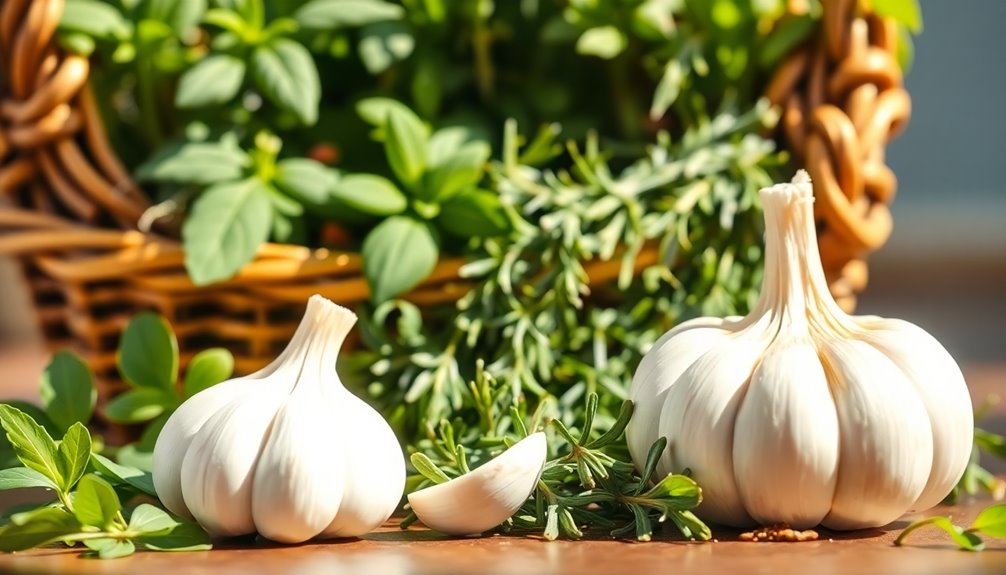
If garlic doesn't sit well with you during pregnancy, there are plenty of flavorful alternatives to explore.
Ginger is a fantastic substitute, known for its anti-nausea properties, aiding digestion and reducing inflammation. Onions, which share similar health benefits, provide flavor and contain antioxidants that support your overall health.
Fresh herbs like basil and oregano add aromatic complexity to your dishes without the potential side effects associated with garlic consumption. Additionally, spices like cumin or paprika can create depth in meals while you maintain a balanced diet. Incorporating these alternatives not only enhances your meals but also guarantees you're nourishing your body and supporting your body mass effectively throughout your pregnancy.
Frequently Asked Questions
Can Eating Garlic Affect Pregnancy?
Eating garlic can have both positive and negative effects during pregnancy. When you consume it in typical food amounts, it's generally safe and may even offer health benefits due to its nutrients and antimicrobial properties.
However, if you eat too much, you might experience heartburn or gastrointestinal discomfort. Plus, garlic can thin your blood, which could be a concern.
Always check with your healthcare provider before making changes to your diet.
Does Garlic Affect Babies?
You might think garlic's some kind of magical potion, but it does have effects on babies.
Consuming garlic in moderation can actually benefit your baby, providing essential nutrients that support their growth. It can boost your immune system too, lowering infection risks.
However, overindulgence can lead to heartburn or bleeding issues, which aren't great for your pregnancy.
Can Raw Garlic Induce Labor?
You might wonder if raw garlic can induce labor. While some traditional beliefs suggest it might, there's no strong scientific evidence to support this claim.
Garlic contains beneficial compounds, but their effects on triggering contractions haven't been thoroughly studied. It's important to be cautious with excessive garlic intake, as it can lead to gastrointestinal discomfort and increased bleeding risk.
Always consult your healthcare provider for personalized dietary advice during pregnancy.
What Is the Garlic Test for Pregnancy?
The Garlic Test for pregnancy involves you consuming garlic to see if it causes any noticeable changes in your body or mood, which some believe could indicate hormonal shifts or pregnancy.
However, this method isn't scientifically validated; it's based on anecdotal evidence and cultural traditions.
While eating garlic in moderation is generally safe during pregnancy, you should always consult your healthcare provider for reliable pregnancy testing and medical advice instead of relying on unproven home remedies.
Conclusion
So, while garlic’s known for warding off vampires, it might not be your best friend during pregnancy. Sure, it offers some health perks, but the risks can leave you in a bit of a pickle. You wouldn’t want to take chances with your little one, right? Instead of munching on raw cloves, why not consult your healthcare provider and explore safer alternatives? After all, it’s all about keeping both you and your baby safe—and maybe avoiding a garlic breath showdown! Taking care of your health during this delicate time is a priority, and that includes considering what you eat. Many soon-to-be parents find themselves wondering about various aspects of pregnancy, like why do babies smile in sleep, as they anticipate their little one’s arrival. It’s fascinating to think about the little things that can bring joy even before birth, so focus on nurturing your body with safe and healthy foods instead!









